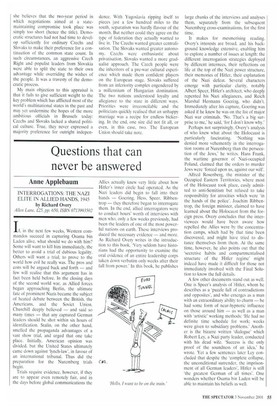Questions that can never be answered
Anne Applebaum
INTERROGATIONS: THE NAZI ELITE IN ALLIED HANDS, 1945 by Richard Overy Allen Lane, 125, pp. 650, ISBN 0713993502 If, in the next few weeks, Western commandos succeed in capturing Osama bin Laden alive, what should we do with him? Some will want to kill him immediately, the better to avoid a trial of dubious legality. Others will want a trial, to prove to the world how evil he really was. The pros and cons will be argued back and forth — and few will realise that this argument has in fact been held before. In the closing days of the second world war, as Allied forces began approaching Berlin, the ultimate fate of prominent Nazis became the subject of heated debate between the British, the Americans, and the Soviet Union. Churchill deeply believed — and said so many times — that any captured German leaders should be shot within six hours of identification. Stalin, on the other hand, smelled the propaganda advantages of a vast show trial, and urged that one take place. Initially, American opinion was divided, but the United States ultimately came down against 'lynch-law', in favour of an international tribunal. Thus did the preparation for the Nuremberg trials begin.
Trials require evidence, however, if they are to appear even remotely fair, and in the days before global communications the Allies actually knew very little about how Hitler's inner circle had operated. As the Nazi leaders did begin to fall into their hands — Goering, Hess, Speer, Ribbentrop — they therefore began to interrogate them. In the end, allied interrogators were to conduct hours' worth of interviews with men who, only a few weeks previously, had been the leaders of one of the most powerful nations on earth. These interviews produced the necessary evidence — and more. As Richard Overy writes in the introduction to this book, 'Very seldom have historians had the opportunity to examine the oral evidence of an entire leadership corps taken down verbatim only weeks after their fall from power.' In this book, he publishes large chunks of the interviews and analyses them, separately from the subsequent Nuremberg cross-examinations, for the first time.
It makes for mesmerising reading. Overy's interests are broad, and his background knowledge extensive, enabling him to explore a number of issues at length: the different interrogation strategies deployed by different internees, their reflections on life at the top of the Nazi power structure, their memories of Hitler, their explanation of the Nazi defeat. Several characters emerge with particular clarity, notably Albert Speer, Hitler's architect, who deeply repented his Nazi allegiances, and Reich Marshal Hermann Goering, who didn't. Immediately after his capture, Goering was asked if he knew he was on the list of major Nazi war criminals. 'No. That's a big surprise to me,' he said, 'for I don't know why.'
Perhaps not surprisingly, Overy's analysis of who knew what about the Holocaust is particularly fascinating. 'Nothing was denied more vehemently in the interrogation rooms at Nuremberg than the persecution of the Jews,' he writes. Hans Frank, the wartime governor of Nazi-occupied Poland, claimed that the orders to murder Jews were 'forced upon us, against our will'.
Alfred Rosenberg, the minister of the Occupied Eastern Territories, where most of the Holocaust took place, easily admitted to anti-Semitism but refused to take responsibility for atrocities which were 'in the hands of the police'. Joachim Ribbentrop, the foreign minister, claimed to have learned about the Holocaust from the foreign press. Overy concludes that the interviewees would have been aware how repelled the Allies were by the concentration camps, which had by that time been discovered, and might have tried to distance themselves from them. At the same time, however, he also points out that the 'secretive habits and compartmentalised structure of the Hitler regime' might indeed have made it difficult for those not immediately involved with the Final Solution to know the full details.
A few other documents stand out as well. One is Speer's analysis of Hitler, whom he describes as a 'puzzle full of contradictions and opposites', and who emerges as a man with an extraordinary ability to charm — he had some form of near-hypnotic influence on those around him — as well as a man with 'artistic' working methods: 'He had no definite time schedule for work; weeks were given to subsidiary problems.' Another is the bizarre written 'dialogue' which Robert Ley, a Nazi party leader, conducted with his dead wife. 'Success is the only proof of the soundness of an idea,' he wrote. Yet a few sentences later Ley concluded that despite the 'complete collapse, the unconditional surrender, the imprisonment of all German leaders', Hitler is still 'the greatest German of all times'. One wonders whether Osama bin Laden will be able to maintain his beliefs as well.


















































































 Previous page
Previous page